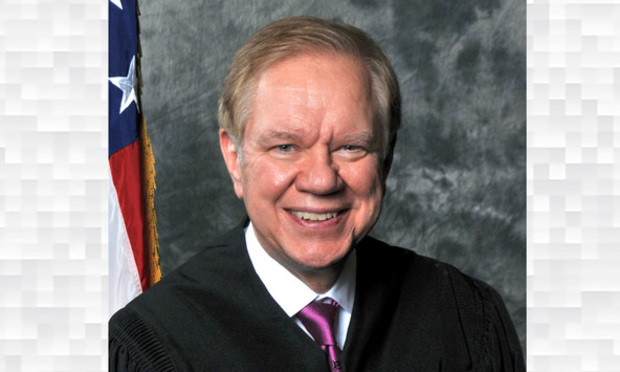3rd Circuit Finds No Vicarious Liability in Case of Husband-Wife Attorneys
The split panel found there was no partnership between the husband-wife team to make a claim of vicarious liability for legal malpractice.
August 21, 2019 at 01:30 PM
4 minute read
 U.S. Third Circuit Judge Thomas Ambro. Courtesy photo.
U.S. Third Circuit Judge Thomas Ambro. Courtesy photo.
A lawyer who practices alongside her spouse is not liable for a legal malpractice lawsuit against him if there's no partnership agreement, the U.S. Court of Appeals for the Third Circuit has ruled.
While representations by attorney George Cotz might have given client Bonnie Messler the impression that she retained the law firm of Cotz & Cotz, Cotz's spouse is not vicariously liable to the client because Messler did not rely on those representations in choosing counsel, the appeals court said. The ruling affirmed a district court judge's decision dismissing the vicarious liability claim against Cotz's wife, Lydia.
Third Circuit Judges Thomas Ambro and Michael Chagares affirmed the district court ruling while Joseph Greenaway Jr. dissented in holding that Messler demonstrated she relied on the existence of a partnership.
The case stems from George Cotz's representation of Messler in a wrongful termination suit in Superior Court of New Jersey against her employer, Wakefern Food Corp. A judgment was entered for the defendant after Cotz failed to respond to its motion for summary judgment.
Messler signed a retainer agreement on letterhead with the heading Cotz & Cotz, under which was printed "Attorneys at Law" and which listed the names of George Cotz and Lydia Cotz.
But no legal entity named Cotz & Cotz existed, and the couple never entered into a partnership agreement. Through the course of representation, Messler never had contact with Lydia Cotz and received no work product from her.
Messler filed a legal malpractice suit in state Superior Court against George Cotz and Cotz & Cotz. The case was removed to federal court on diversity grounds because George Cotz is a New York resident. After the case was removed, Messler added Lydia Cotz as a defendant.
Lydia Cotz moved for summary judgment, arguing that Messler never established the elements necessary for partnership by estoppel under New Jersey law.
U.S. District Judge Freda Wolfson held that the retainer agreement in the name of Cotz & Cotz created the indicia of partnership, but Messler did not meet her burden to show she relied on that apparent representation, which is a necessary element to establish partnership by estoppel.
On appeal, Ambro and Chagares said George Cotz represented he was in a partnership but there was no evidence that Messler retained him because of those statements. And Messler admits she never asked about the involvement of Lydia Cotz in the employment matter.
"Why not, if she cared that Mr. Cotz had a law partner when hiring him? No reasonable factfinder could conclude from the summary judgment record that Messler was relying on the representation that Mr. Cotz was in partnership when she entered into a transaction with him," Chagares wrote for the court.
In his dissent, Greenaway said Messler offered sufficient evidence to create a factual dispute about her reliance on Cotz & Cotz in making her hiring decision, making summary judgment inappropriate.
Kenneth Thyne of Roper & Twardowsky in Totowa, who represented Messler, called the panel's approach "formalistic," and said "no one would ever say I retained Cotz & Cotz because it's a partnership."
Thyne said he wanted his client to be able to collect from an insurance policy in the name of Lydia Cotz. George Cotz agreed to settle the malpractice claim against him for $10,000 in September 2017 but he has not paid that amount yet, has no insurance and claims to have no assets, said Thyne.
George Cotz, who is self-represented, declined to comment. Mark Kundla and Patrick McCormick of Hardin Kundla McKeon & Poletto in Springfield, who represented Lydia Cotz, did not return calls seeking a comment.
This content has been archived. It is available through our partners, LexisNexis® and Bloomberg Law.
To view this content, please continue to their sites.
Not a Lexis Subscriber?
Subscribe Now
Not a Bloomberg Law Subscriber?
Subscribe Now
NOT FOR REPRINT
© 2025 ALM Global, LLC, All Rights Reserved. Request academic re-use from www.copyright.com. All other uses, submit a request to [email protected]. For more information visit Asset & Logo Licensing.
You Might Like
View All
Law Firms Look to Gen Z for AI Skills, as 'Data Becomes the Oil of Legal'



Trending Stories
- 1Troutman Pepper, Claiming Ex-Associate's Firing Was Performance Related, Seeks Summary Judgment in Discrimination Suit
- 2Law Firm Fails to Get Punitive Damages From Ex-Client
- 3Over 700 Residents Near 2023 Derailment Sue Norfolk for More Damages
- 4Decision of the Day: Judge Sanctions Attorney for 'Frivolously' Claiming All Nine Personal Injury Categories in Motor Vehicle Case
- 5Second Judge Blocks Trump Federal Funding Freeze
Who Got The Work
J. Brugh Lower of Gibbons has entered an appearance for industrial equipment supplier Devco Corporation in a pending trademark infringement lawsuit. The suit, accusing the defendant of selling knock-off Graco products, was filed Dec. 18 in New Jersey District Court by Rivkin Radler on behalf of Graco Inc. and Graco Minnesota. The case, assigned to U.S. District Judge Zahid N. Quraishi, is 3:24-cv-11294, Graco Inc. et al v. Devco Corporation.
Who Got The Work
Rebecca Maller-Stein and Kent A. Yalowitz of Arnold & Porter Kaye Scholer have entered their appearances for Hanaco Venture Capital and its executives, Lior Prosor and David Frankel, in a pending securities lawsuit. The action, filed on Dec. 24 in New York Southern District Court by Zell, Aron & Co. on behalf of Goldeneye Advisors, accuses the defendants of negligently and fraudulently managing the plaintiff's $1 million investment. The case, assigned to U.S. District Judge Vernon S. Broderick, is 1:24-cv-09918, Goldeneye Advisors, LLC v. Hanaco Venture Capital, Ltd. et al.
Who Got The Work
Attorneys from A&O Shearman has stepped in as defense counsel for Toronto-Dominion Bank and other defendants in a pending securities class action. The suit, filed Dec. 11 in New York Southern District Court by Bleichmar Fonti & Auld, accuses the defendants of concealing the bank's 'pervasive' deficiencies in regards to its compliance with the Bank Secrecy Act and the quality of its anti-money laundering controls. The case, assigned to U.S. District Judge Arun Subramanian, is 1:24-cv-09445, Gonzalez v. The Toronto-Dominion Bank et al.
Who Got The Work
Crown Castle International, a Pennsylvania company providing shared communications infrastructure, has turned to Luke D. Wolf of Gordon Rees Scully Mansukhani to fend off a pending breach-of-contract lawsuit. The court action, filed Nov. 25 in Michigan Eastern District Court by Hooper Hathaway PC on behalf of The Town Residences LLC, accuses Crown Castle of failing to transfer approximately $30,000 in utility payments from T-Mobile in breach of a roof-top lease and assignment agreement. The case, assigned to U.S. District Judge Susan K. Declercq, is 2:24-cv-13131, The Town Residences LLC v. T-Mobile US, Inc. et al.
Who Got The Work
Wilfred P. Coronato and Daniel M. Schwartz of McCarter & English have stepped in as defense counsel to Electrolux Home Products Inc. in a pending product liability lawsuit. The court action, filed Nov. 26 in New York Eastern District Court by Poulos Lopiccolo PC and Nagel Rice LLP on behalf of David Stern, alleges that the defendant's refrigerators’ drawers and shelving repeatedly break and fall apart within months after purchase. The case, assigned to U.S. District Judge Joan M. Azrack, is 2:24-cv-08204, Stern v. Electrolux Home Products, Inc.
Featured Firms
Law Offices of Gary Martin Hays & Associates, P.C.
(470) 294-1674
Law Offices of Mark E. Salomone
(857) 444-6468
Smith & Hassler
(713) 739-1250






